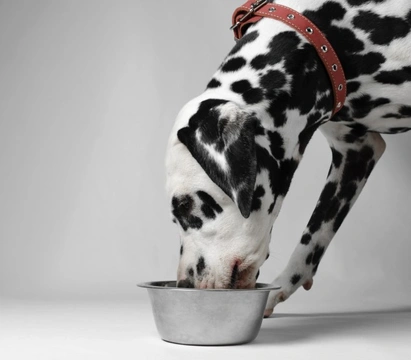
Why Does My Dog Cough When Eating?
Coughing in the dog is one of those complex symptoms that can indicate a whole range of things, from very minor or transient issues right through to serious and acute health conditions. Because coughing in and of itself might not seem to be bothering your dog much or sound very painful or congested, it is often overlooked as a symptom when viewed as a standalone issue, even when the cough has been present to some degree for a long time.
If your dog is apt to cough during or after eating, this may be something that you don’t pay much attention to, or simply write off as a case of the food going down the wrong way now and then. But coughing when eating can, in some cases, indicate a potentially serious problem, and so it is important not to simply write it off without further consideration.
In this article, we will look at some of the common causes for a dog coughing during or after eating, and what can be done about them. Read on to learn more.
How can you tell if there might be a problem?
If your dog has gulped down their food or drunk water quickly and coughs a couple of times afterwards as a one-off occurrence, this is highly unlikely to indicate a problem, other than with your dog’s speed and enthusiasm for eating! However, if they reliably cough every time during or after eating, or if this happens often enough that you are beginning to notice a pattern, it may be cause for concern.
Next, we will look at some of the things that may be causing regular or frequent coughing during or after eating.
Eating too fast
Most dogs are very keen to transfer their meals from their bowl to their stomach, and few dogs really eat slowly and take the time to savour their food. If your dog has eaten half of their dinner before the bowl even hits the floor, or hoovers up their meal within a few seconds, this type of rapid eating means for one that they are unlikely to be chewing their food properly, and for two, that bolting down their food at such as rapid rate is likely to lead to coughing, burping or the hiccups afterwards.
Certain breeds of dog such as the Labrador retriever are infamously quick eaters, and speed-eating is also commonly seen in puppies, as well as dogs that have learnt that if they do not eat fast, another dog might take their food!
Eating quickly enough to cause coughing afterwards does not constitute a health condition in itself, but it does come with risks; food may be aspirated into the lungs, which in turn, can lead to infections. It may also place your dog at risk of indigestion and other digestive disorders. Buying a special bowl that forces your dog to pick around obstacles to get their food, or placing a large, hard ball in the bowl may help to slow your dog down.
Heart conditions
Coughing is one of the lesser-known symptoms of heart problems like heart disease, and often accompanies a heart murmur. As well as coughing after eating, such dogs may display a mild, soft cough at other times too, which will not usually be productive or worsen over time, but as it may be an indicator of a heart problem, should be investigated by your vet.
Tracheal collapse
Tracheal collapse is a condition in which the cartilage of the trachea or windpipe does not hold the tube open in the way that it should, leading to the pipe itself collapsing, which leads to a honking, coughing sound when your dog attempts to eat. This condition is more likely to occur in very small dog breeds and in dogs that are overweight, and can often be resolved in overweight dogs by helping them to shed their excess pounds.
In other cases, corrective surgery may be indicated.
Oesophageal disease
Various conditions that affect either the oesophagus or the larynx may display symptoms such as acute coughing when eating or drinking, as the larynx will not close up properly and so, permits food to enter the trachea. As with other cases in which food is aspirated into the trachea or lungs, this can, over time, result in the development of pneumonia as well as a cough.
Food allergies
A whole range of different foods and individual ingredients can trigger allergies in certain dogs, and if your dog is fed a diet that triggers an allergy, this will likely present with a range of symptoms including coughing, particularly when they are eating said food or immediately afterwards.
Identifying the allergenic trigger and switching your dog over to a more suitable food will resolve this issue.
Obstructions
If your dog is apt to eat their toys or other things that are not food, these will often become lodged in the throat or food tube, providing a constant obstruction and problem for your dog. Eating and drinking are likely to make the problem more acute, which can again lead to coughing when eating, as the food must negotiate the obstruction within the digestive tract.



